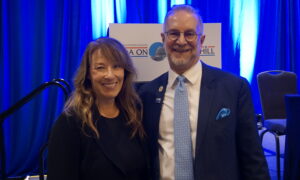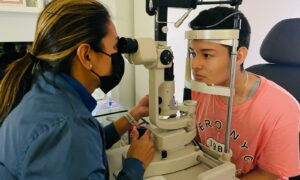May 1, 2023
By Ashley Wallace-Tucker, OD, FAAO, FSLS
Most of us have our preferred method(s) of myopia management, but when working with a family with more than one child in need, we may have to be creative in order to get the entire family in a program.

Having a discussion with parents about fees for myopia management for one child can often feel daunting. Imagine preparing for that same discussion when more than one child from the same family is in need of myopia treatment.
As eye care professionals, we are obligated to make the recommendation that is best for the patient regardless of a fear of rejection or of any preconceived ideas of what a family may be able to afford. In a perfect world, fees would not hinder a family from getting what is best for their child. In reality, this can be a true deterrent, especially when recommending a higher level of service for multiple children. Here are some tips to make the conversation more comfortable for both the parent and the practitioner.
Be Confident
Always be mindful that we are the experts in myopia management, and patients seek our care and expertise. Parents ultimately want their children to have what they need, and they typically find the means to provide it. In fact, most parents are willing to spend more money on their children than on themselves. When presenting fees, remember to add value to a myopia management program before presenting the fees. You are creating a solution to their children’s myopia progression and protecting their eye health, and they are investing in that solution. “It is my pleasure to be working with your family! Our program will be custom tailored to each of your child’s individual needs, and I am committed to doing my part in slowing their myopia progression.”
Be Accommodating
Although most parents expect to pay for a pair of glasses or even a supply of regular contacts for their children, they are not usually prepared to be presented with the hefty price tag of a myopia management program. So, to lighten the burden, offer them options. “Although we do not want your children’s prescriptions to get any worse than they are right now, I completely understand that this is a financial commitment you may not have been prepared for. My office and I will work with you to make this as simple as possible for your family.”
Even though there can be a sense of urgency when it comes to myopia management, let the parents know you can work with their timeline, and it is perfectly fine to wait until they are financially ready. Offer them a follow-up visit in three to six months to revisit the conversation and potentially start the programs at that time.
There are also health care credit cards specifically designed to help patients pay for medical services that are not fully covered by insurance. When offering high-level services such as myopia management, practitioners should consider offering at least one of these options in their practice. These cards allow the practitioner to get paid up front, and they allow the patient to finance the program at a more palatable monthly rate.
Don’t forget to remind parents that Flexible Spending Accounts (FSAs) and Health Savings Accounts (HSAs) can be utilized for myopia management programs. Many patients forget they have these accounts and are incredibly grateful when you remind them, thus, creating an unexpected avenue to provide for their children’s needs. On the other hand, some parents are aware their company offers these accounts and have not taken advantage of them. Encourage parents to consider enrolling — this can ultimately provide them with a tax break and/or free matched funds from their company.
Be Creative
Most of us have our preferred method(s) of myopia management, but when working with a family with more than one child in need, we may have to be creative in order to get the entire family in a program. In general, off-label treatment options are less costly to practitioners but are arguably clinically effective. If there is a sense of financial concern when initiating the conversation, inform the parents that we have options.
You may say something like the following: “Right now is the best time to be myopic! We have so many options to slow your child’s myopia progression — from contact lenses to eye drops. There are two categories of contacts available to us. One is FDA approved, and one is not FDA approved yet. Although they have different designs, they all have been proven clinically effective in slowing myopia progression and are safe for your children. Similarly, the eye drops are not FDA approved yet, but they are also clinically effective and safe.”
Be Humble
By no means should a practitioner feel obligated to discount fees, but if possible and feasible, consider it as an office policy regardless of financial ability when more than one family member is signing up for a myopia management program. This concept is customary in many businesses, including child care and sports programs. There will be significantly less time spent on the conversation about the benefits of myopia management since the practitioner will only have to do it once per family. If the patients are prescribed contact lenses, perhaps the insertion and removal training could be done simultaneously, taking up less personnel and staff time. Lastly, the visits for all participating children could overlap, ultimately taking up less space on the schedule.
You may present this by saying: “I am overjoyed to be working with your family! As a courtesy, we are happy to offer a __% discount for each additional child who enrolls in a myopia management program.”
In conclusion, having the opportunity to offer myopia management services to more than one child from the same family is truly a gift and a huge compliment to us as practitioners. Appreciate this idea and allow it to be what helps you navigate the conversation with each family.
 |
Dr. Ashley Tucker graduated from the University of Houston College of Optometry in 2010 and completed a Cornea and Contact Lens Residency at UHCO in 2011. Dr. Tucker is a partner at Bellaire Family Eye Care, a private practice in the Houston, Texas, area where she primarily manages patients in need of specialty contact lenses and myopia management. She is also a Visiting Assistant Professor at UHCO and is the course master for the Ophthalmic Optics laboratories. In addition, Dr. Tucker is a member of the Speaker’s Bureau for the Specialty Division of Bausch + Lomb, a consultant for CooperVision, and a lecturer for the STAPLE (Soft Toric and Presbyopic Lens Experience) program. |
To get more advice from leaders in the field of myopia management on setting fee structures and other aspects of myopia finance, click here.













